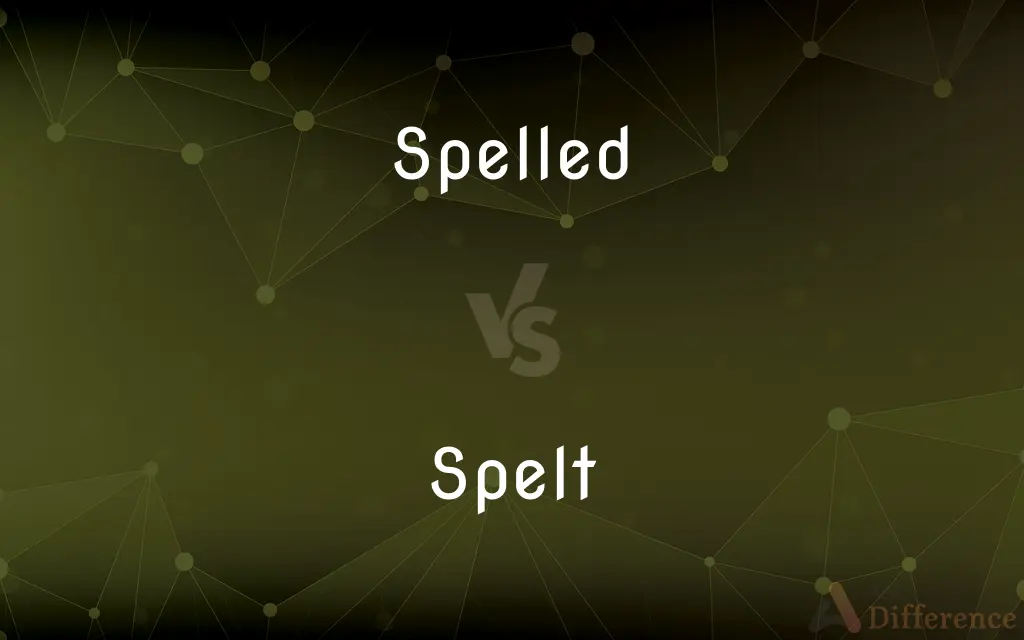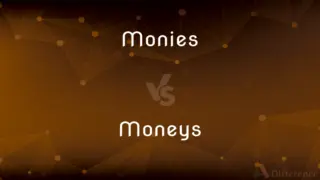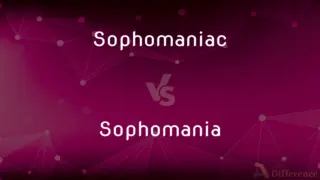Spelled vs. Spelt — What's the Difference?
By Tayyaba Rehman — Updated on October 13, 2023
"Spelled" and "spelt" both refer to the past tense and past participle of the verb "spell," with "spelled" being more common in American English and "spelt" in British English.

Difference Between Spelled and Spelt
Table of Contents
ADVERTISEMENT
Key Differences
"Spelled" and "spelt" serve as the past tense and past participle forms of the verb "spell," which means to form words with letters in the correct sequence. "Spelled" is the preferred form in American English. When Americans talk about the action of forming words, they would typically say, "I spelled the word correctly."
In contrast, "spelt" is commonly used in British English. If you were in the UK and someone was discussing how they wrote a word, they might say, "I spelt the word correctly." However, this distinction is not strictly observed, and you might occasionally find "spelled" in British writings and "spelt" in American contexts.
The variations between "spelled" and "spelt" are part of a broader pattern where certain verbs have different past tense forms in American and British English. For instance, while Americans might say "learned," Brits might prefer "learnt." Similarly, where "spelled" is favored in the US, "spelt" finds its home in the UK.
However, both "spelled" and "spelt" are correct and understood internationally. English speakers around the world recognize both forms. The choice between them largely hinges on regional preferences and the intended audience of the writing.
Lastly, while the distinction between "spelled" and "spelt" primarily revolves around regional usage, it's worth noting that the evolution of language is fluid. Over time, as cultures and languages intermingle, the rigid lines distinguishing one form from the other might blur, leading to increased interchangeability.
ADVERTISEMENT
Comparison Chart
Regional Preference
Preferred in American English.
Commonly used in British English.
Function
Past tense and past participle of "spell."
Past tense and past participle of "spell."
Example Sentence
"She spelled the word wrong."
"She spelt the word wrong."
Similar Variations
Analogous to "learned" in American English.
Analogous to "learnt" in British English.
Global Understanding
Understood internationally but more common in the US.
Recognized globally but more frequent in the UK.
Compare with Definitions
Spelled
Spelled (Designate or indicate)
This spelled disaster for the project.
Spelt
Spelt (Past tense of "spell" in British English)
I spelt the word without checking.
Spelled
Spelled (Past tense of "spell")
I spelled the word without checking.
Spelt
Spelt (Designate or indicate in British English)
This spelt disaster for the project.
Spelled
Spelled (Allow someone rest)
She spelled him at the watch.
Spelt
Spelt (Meaning or result in British English)
His actions spelt success.
Spelled
Spelled (Formation of words)
He spelled out his name for clarity.
Spelt
Spelt (Formation of words in British English)
He spelt out his name for clarity.
Spelled
To name or write in order the letters constituting (a word).
Spelt
Spelt (Allow someone rest in British English)
She spelt him at the watch.
Spelled
To constitute the letters of (a word)
These letters spell animal.
Spelt
Spelt (Triticum spelta), also known as dinkel wheat or hulled wheat, is a species of wheat that has been cultivated since approximately 5,000 BC. Spelt was an important staple food in parts of Europe from the Bronze Age to medieval times. Now it survives as a relict crop in Central Europe and northern Spain, and it has found a new market as a health food.
Spelled
To add up to; signify
Their unwise investment could spell financial ruin.
Spelt
An old kind of wheat with bearded ears and spikelets that each contain two narrow grains, not widely grown but favoured as a health food.
Spelled
To name or write in order the letters of a word or words
I've never been able to spell very well.
Spelt
A type of wheat (Triticum spelta syn. T. aestivum subsp. spelta) having a tough hull. It was widely cultivated in southwest Asia, the Near East, and Europe during the Bronze Age and is now grown chiefly in Europe.
Spelled
To put (someone) under a spell; bewitch.
Spelt
A past tense and a past participle of spell1.
Spelled
To relieve (someone) from work temporarily by taking a turn.
Spelt
Simple past tense and past participle of spell
Spelled
To allow (someone) to rest a while.
Spelt
(obsolete) To split; to break; to spalt.
Spelled
To take turns working.
Spelt
A grain, considered either a subspecies of wheat, Triticum aestivum subsp. spelta, or a separate species Triticum spelta or Triticum dicoccon.
Hulled wheat
Spelled
(Australian) To rest for a time from an activity.
Spelt
A thin piece of wood or metal; a splinter.
Spelled
A word or formula believed to have magic power.
Spelt
(metalworking) Spelter.
Spelled
A bewitched state or trance
The sorcerer put the prince under a spell.
Spelt
A species of grain (Triticum Spelta) much cultivated for food in Germany and Switzerland; - called also German wheat.
Spelled
A compelling attraction; charm or fascination
The spell of the theater.
Spelt
Spelter.
Spelled
A short, indefinite period of time.
Spelt
To split; to break; to spalt.
Spelled
(Informal) A period of weather of a particular kind
A dry spell.
Spelt
Hardy wheat grown mostly in Europe for livestock feed
Spelled
One's turn at work.
Spelled
A period of work; a shift.
Spelled
(Australian) A period of rest.
Spelled
(Informal) A period of physical or mental disorder or distress
A dizzy spell.
Spelled
(Informal) A short distance.
Spelled
Simple past tense and past participle of spell
Spelled
Spelled (Meaning or result)
His actions spelled success.
Common Curiosities
Is "spelled" the correct past tense of "spell"?
Yes, "spelled" is the correct past tense, especially in American English.
Are there other verbs with similar American/British variations?
Yes, for instance, "learned" (American) vs. "learnt" (British).
Is there a difference in meaning between "spelled" and "spelt"?
No, they both serve as the past tense and past participle of "spell."
Can "spelt" be used in American English?
While "spelt" is understood in American English, "spelled" is the preferred form.
Why do Americans prefer "spelled"?
Linguistic evolutions have led to regional preferences; "spelled" became standard in American English.
Can I use "spelled" in British English?
Yes, "spelled" is understood in British English, but "spelt" is more common.
Is one form more formal than the other?
No, both forms are standard and formal; the choice is based on regional preference.
Is "spelt" also a type of grain?
Yes, "spelt" is a type of wheat; context will clarify the intended meaning.
Do English speakers in other countries prefer "spelled" or "spelt"?
It varies, but many former British colonies might lean towards "spelt."
Share Your Discovery

Previous Comparison
Monies vs. Moneys
Next Comparison
Sophomaniac vs. SophomaniaAuthor Spotlight
Written by
Tayyaba RehmanTayyaba Rehman is a distinguished writer, currently serving as a primary contributor to askdifference.com. As a researcher in semantics and etymology, Tayyaba's passion for the complexity of languages and their distinctions has found a perfect home on the platform. Tayyaba delves into the intricacies of language, distinguishing between commonly confused words and phrases, thereby providing clarity for readers worldwide.
















































